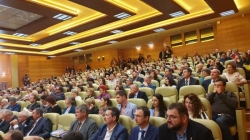Seven decades of Industrial Chemistry in Timisoara
Seven decades of Industrial Chemistry in Timisoara
The Faculty of Industrial Chemistry and Environmental Engineering, one of the oldest within Politehnica University Timişoara, is living a festive moment. Friday, November 9, 2018, the 70th anniversary of the establishment of the faculty took place in the Auditorium of the Conference Center of Politehnica University Timisoara.
The festive event was attended by the Minister of Research and Innovation, Nicolae Hurduc (Chemist Engineer), State Secretary at the Ministry of National Education, Petru Andea, former Education Minister and Doctor Honoris Causa of UPT, Ecaterina Andronescu (chemist), Mayor of Timisoara, Nicolae Robu, the entire leadership of the Politehnica University Timişoara, representatives of the partner chemistry faculties in the country and abroad, former deans of the faculty, teachers and students.
Ioan Drăgoi, a student of the first generation, 70 years old, later became a professor of the faculty and dean between 1984 and 1989. In the guest speakers was mentioned the history of the faculty, marked by great names such as Coriolan Drăgulescu , Ilie Murgulescu, Vasile Cocheci, George Ostrogovich, Alexandru Cisman and many others.
70 years ago, on a beautiful autumn day, 148 young students headed for the first classes at the new Industrial Chemistry Faculty, established on the Banat fields, within the Polytechnic School, which, after the education reform in Romania, became the Polytechnic Institute from Timisoara. It was October 1, 1948, and since then the academic activity in the faculty has been uninterrupted, with remarkable results obtained both in the preparation of students and in the applied and theoretical scientific research. The seven decades of university education at the Faculty of Industrial Chemistry means not only tradition and continuity but also high-level professional competence.
The founder of the faculty can be considered Professor Coriolan Drăgulescu, who has unswervingly followed his dream of setting up a chemical engineering school in Timisoara. With the support of the distinguished scientist who was Professor Ilie Murgulescu, then rector of the Polytechnic Institute of Timisoara, the Senate of this institution was presented with the "Memorial" that justified the establishment of our faculty. The approval of the Senate of the Polytechnic Institute came on 18 February 1948, and in the same year, on 22 July, the Presidential Decree no. 161 of the Presidium of the Grand National Assembly for the establishment of the faculty, signed by C. I. Parhon. This document is the birth certificate of the Faculty of Chemical Industry of Timisoara.
At the beginning, the faculty worked with two specialization departments: Mineral Chemistry and Synthesis Chemistry, the duration of the studies being 4 years. Starting in 1950, the duration of the studies is five years, and it is divided into three specializations: Inorganic Chemical Technology, Organic Chemical Technology and Building Materials. In 1964, the fourth specialization - Technology of macromolecular compounds appears.
The development of the faculty was not jeopardized by events that threatened its very existence. Dramatic moments have taken place since the revolt of the Timisoara students in the autumn of 1956. Miron Constantinescu, Minister of Education for a short time, decided to move the Timisoara Industrial Chemistry Faculty to Brasov (the former Stalin city). Only the fall in the disgrace of the leadership of the Romanian Communist Party of Miron Constantinescu saved the faculty from this unnecessary transfer.
The number of students has steadily increased, reaching a peak of over 1600 at the end of the 1970s. After 1989, a restructuring of chemical engineering education was required. A revival in the development of the faculty was registered by the establishment of the field of Environmental Engineering in 1995. The Faculty became Industrial Chemistry and Environmental Engineering. A new impetus was given in 2012 by addressing a new field - Food Engineering, taking into account the development of the industry in the west of the country. At present, the number of university students has stabilized at about 570 (bachelor's, master's and PhD degrees), with about 50 teachers being trained.





















